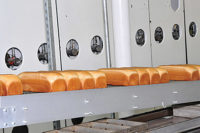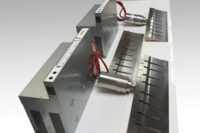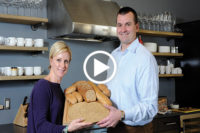That same year, Marie Callender and her family began delivering homemade pies to restaurants from a little shop in Long Beach, Calif. She eventually opened her own restaurants and launched a frozen food line under her name.
In the 1940s to the 1950s, ABA focused on the promotion and marketing of bread and baked goods. After being postponed due to WWII, the enriched bread standard was finalized in 1952. Whole grains and enriched grains, alike, provided a wide array of health benefits and helped prevent a number of different health conditions and ailments. Enriched grain products were and are a good source of iron and the four B vitamins thiamine, niacin, riboflavin and folic acid, as well as complex carbohydrates.
Tradeshows, sanitation, cheesecake
In 1949, BEMA invited ABA to co-sponsor the Baking Expos. The partnership with BEMA members as exhibitors and ABA members as attendees proved quite successful, and is still strong and vibrant today. BEMA and ABA open the International Baking Industry Exposition (IBIE) with a ribbon cutting ceremony each year the show is held.
Dunkin’ Donuts, an international donut and coffee retailer, was founded in 1950 by William Rosenberg in Quincy, Mass. The huge donut chain is now headquartered in Canton, Mass. The company originally focused on donuts and other baked goods, but more than half of the business today is in coffee sales, making it more a competitor to Starbucks than to Krispy Kreme and Tim Hortons. In 1951, at the request of the U.S. Government, BEMA, representing the baking industry, and along with other industries, formed the National Defense Preparedness Committee to determine the nation’s metal requirements for every industry. BEMA was first to submit its report to the federal government.
At the 1955 Bakery Expo, the first Bakery Equipment Guide was distributed, and more than 13,000 attendees viewed the first continuous mixing systems of bread production. Another landmark occasion that year, which has impacted bakers ever since, was the building of the first McDonalds’ restaurant. More fast food restaurants and TV dinners began appearing on the scene.
NCM expanded beyond the continental United States in 1957 with the construction of the Molinos de Puerto Rico feed, flour and corn-milling complex. In 1962, Boudin Bakery’s Steve Giraudo, Jr., Steve Giraudo Sr.’s older son, began working at the bakery full-time.
By 1957, more than 450 major bakeries were subscribers to AIB’s Sanitation Education program, a multi-faceted approach to bakery sanitation. AIB was also directly involved in the compilation of sanitary standards for baking equipment, as a member of the BISSC. The institute conducted a conference to assist in the drafting and implementation of practices for the handling of potentially hazardous bakery foods as a segment of the Good Manufacturing Practices for Sanitation, promulgated by the Food and Drug Administration in 1968. Also that year, the institute’s Sanitation Education Department conducted inspections of 920 baking and food plants, some of which received more than one visit.




















